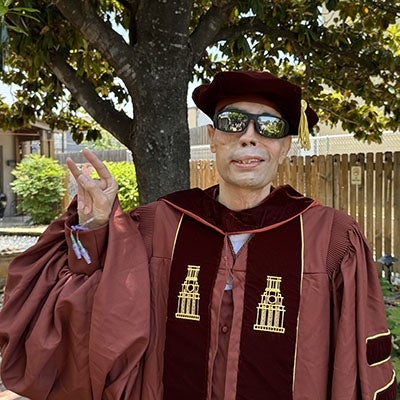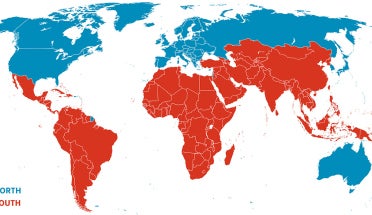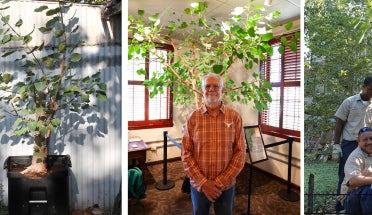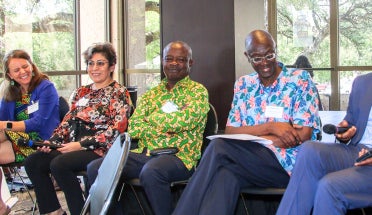
Social Work Award Honors Graduate’s Humanitarian Advocacy
- Jun 26, 2025
The Steve Hicks School of Social Work at The University of Texas at Austin has established the Qusay Hussein Humanitarian Award, to be given annually to a graduating student who demonstrates strength of character, resilience and compassion for others.

The award is named for beloved graduate Qusay Hussein (BSW ’21, MSSW ’22, Ph.D. ’25), who walked across the graduation stage in May 2025 to earn his doctorate in social work, honoring the promise he’d made to his father to obtain an education in the United States.
Just days after graduation, at age 36, Hussein died after fighting kidney cancer for two years.
He had developed close relationships within the UT community, particularly at Texas Social Work, where he worked as a teaching assistant, student mentor and research assistant.
"Dr. Qusay Hussein studied in our programs at UT at the bachelor’s, master’s and doctoral levels,” said Professor Sandy Magaña, who served as Hussein’s dissertation supervisor. “He was determined from his first step on the UT campus (and even before) to become a Ph.D. so he could support and motivate others on a broader scale. He lived his life on a day-to-day basis, uplifting others and always staying positive despite his challenges.”
Hussein’s story is remarkable not just for the immense obstacles he overcame but even more for the inspiring impact he made on colleagues, students, advocacy clients and everyone who came into contact with him.
At the age of 17, Hussein survived a 2006 suicide bombing attack at his home in Mosul, Iraq, which left him blind and critically injured. After enduring dozens of reconstructive surgeries, he resettled in the U.S. in 2012 to seek advanced medical care, but also to pursue an education.
Landing first in New York, he spoke very little English and didn't know how to get his suitcases, which held his only possessions. When he arrived in Austin, he knew no one in the city — but that would soon change.
With help from the Austin American-Statesman’s Season for Caring and Interfaith Action of Central Texas, Hussein took classes to learn English, then obtained his high school equivalency and an associate’s degree at Austin Community College, along with the Presidential Student Achievement award.
Next, he transferred to UT Austin in 2018 and subsequently earned a bachelor’s, then a master’s and, this year, a doctorate in social work. During those years he continued to endure surgeries (more than 70 since the bombing) to repair his face. In the process, he also became a powerful voice for marginalized communities and individuals with disabilities.
"I faced a lot of difficulty and discrimination," Hussein said in an interview with the American-Statesman. "I didn't want any person who came behind me experiencing what I experienced then. When I advocate, I advocate not just for myself, but for others as well."
Hussein was the first UT student to graduate with a minor in disability studies, which he helped create. He served on UT’s Student Advisory Committee for students with disabilities and also as an advisor for Refugee Services of Texas.
He was named a 2025 Outstanding Young Texas Ex, receiving the award created by the Texas Exes to recognize alumni age 39 and under who make significant achievements in their careers, community and service to the University.

During his studies and until his death in June 2025, Hussein continued to give back as an interpreter, mentor and advocate, serving on the boards of Refugee Services of Texas and UT Austin’s Services for Students with Disabilities advisory committee.
His focus on education, advocacy and refugees’ well-being helped him heal from the bombing's effects as well as extend his extraordinary compassion and knowledge to those he encountered.
“He not only succeeded in achieving his degrees, but he also mentored other students at every level through friendship, encouragement and love,” said Magaña. “As a teaching assistant in my class, he taught leadership skills through very creative team-building activities. Many students would seek him out for advice on the next phase of their career.”
Hussein also addressed humanitarian organizations across the world as the “voice of the patients” on the board of Doctors Without Borders, which took care of him after the bombing. He said serving on that board was one of his proudest accomplishments.
Many at Texas Social Work and beyond were inspired and changed not only by Hussein’s integrity, strength and compassion but also by the example he set in the way he lived his life.
“In addition to his impressive academic and organizational accomplishments, Dr. Hussein did many things under the radar,” said Magaña. "He trained for and ran a half-marathon, had the experience of driving a car while blind, and started a nonprofit organization to provide assistive equipment to disabled individuals in Iraq.”
She concluded, “Dr. Hussein’s legacy will live on, and I believe he will positively influence the good in people for years to come.”
For more information, read further stories about Qusay Hussein and the award named for him at the Texas Social Work website, and in the Austin American-Statesman.



